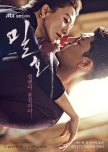Unlike a lot of people going in to this drama, I didn't really approach it with prejudice about its content. I always figure that the actual story isn't the premise or the plot, but what the creators use it to say.
Did they ever deliver on that one.
This is hands down the best drama I've ever watched. It may or may not age into being one of the best things I ever see on screen, but there is a good chance of that happening; and there is no way I won't remember it as a profound influence on who I am and who I was when I first watched it.
That's what this drama is, you see: a zeitgeist. Solely by character study, it captures the frustration of the class divide, and both the actions and the attitudes that preserve it. These it explores from a wealth of perspectives, telling you who a character is by showing you how they think and act. This effortful characterization goes into almost every side character in the show, loveable and hateable alike (and there are good reasons both to love and to hate every one of them); but nowhere as powerfully as when the two leads are in focus.
In classic Movie Appreciation course fashion, it's quite possible to classify them as two philosophical perspectives - Oh Hye Won as the pragmatist and Lee Seon Jae the hedonist - but that's label-gloss, to talk about what they consider important. Large, complex, and tense as the world may be that this show lives in, the whole thing is quite neatly reducible to an extended conversation between these two, arguing about what they care about and how they're going about achieving it.
And providing the throughline, the reason they are having this conversation at all, is the music - grand, melancholic, seductive, consuming. The way the leads are involved in it involves us - you have never in your life listened quite as closely to anything as you have to Schubert's Fantasie as you will while watching Yoo Ah In play it, and Kim Hee Ae listen, transfixed, in the background. Once trapped into paying attention, not once will the soundtrack misstep and let you go. Everything your ears experience for the next fifteen hours, however you divide them up, will have immodest effect on you, and on what you're seeing in even the most innocent exchanges. The story, the acting, the camera, all of it sets you up to be involved, provoked, and entertained - but the music is what makes it matter, in your gut, when even the briefest of glances is stolen, the lightest touch committed. Its presence or absence lends the punch to every word spoken. And in scenes when it's being played by any of the characters - well, good luck trying to focus on anything else.
The pacing is neither slow nor fast. You have the time to savor things, and to appreciate the setting and the world. The external conflict isn't simplistic, for all that it plays second fiddle; it's given its due weight, both in screentime and in how much it matters. Nowhere do you feel redundancy set in; the writer manages to bring some freshness even to the tired chaebol rogues gallery, by not tiptoeing around the foot-level dirty work involved. A little fatigue could set in around the third quarter, but compared to most dramas this is minimal.
The color palette is warm, and the visuals are set up to be striking rather than rich or polished. Superb camerawork, for all that the music is the star of the show; it works organically with the scene and actors, and follows a poetry of its own that becomes more or less subtle depending on the moment.
Rewatching will be for three possible reasons: a)fully understanding the sometimes too-subtle plot, and following the threads that involve the less critical side characters; b) trying to form new perspectives on the show as a whole because we're all wannabe philospohers like that; or c) just enjoying the whole experience again, free to savor every moment of the acting, directing, and music at leisure. The last I do quite often.
tl;dr Like a Tolstoy novel, except I started piano lessons after this show because they make it sexy.
Was this review helpful to you?



